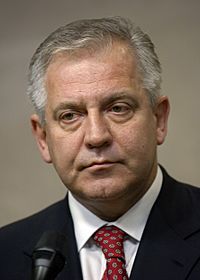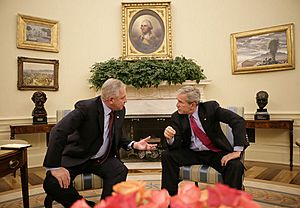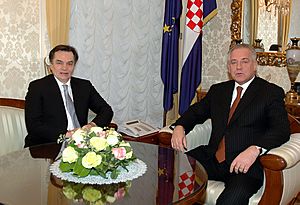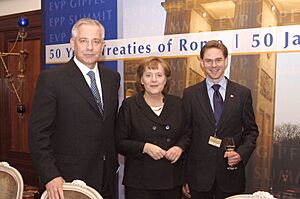Ivo Sanader facts for kids
Quick facts for kids
Ivo Sanader
|
|||||||||||||||||||||||||||||||||||||
|---|---|---|---|---|---|---|---|---|---|---|---|---|---|---|---|---|---|---|---|---|---|---|---|---|---|---|---|---|---|---|---|---|---|---|---|---|---|
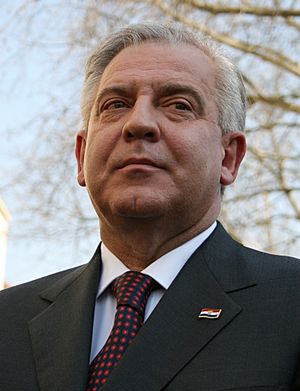
Sanader in 2009
|
|||||||||||||||||||||||||||||||||||||
| Prime Minister of Croatia | |||||||||||||||||||||||||||||||||||||
| In office 23 December 2003 – 6 July 2009 |
|||||||||||||||||||||||||||||||||||||
| President | Stjepan Mesić | ||||||||||||||||||||||||||||||||||||
| Deputy |
Cabinet I (2003–2008)
Cabinet II (2008–2009)
|
||||||||||||||||||||||||||||||||||||
| Preceded by | Ivica Račan | ||||||||||||||||||||||||||||||||||||
| Succeeded by | Jadranka Kosor | ||||||||||||||||||||||||||||||||||||
| Minister of Science and Technology | |||||||||||||||||||||||||||||||||||||
| In office 12 August 1992 – 7 January 1993 |
|||||||||||||||||||||||||||||||||||||
| Preceded by | Jure Radić | ||||||||||||||||||||||||||||||||||||
| Succeeded by | Branko Jeren | ||||||||||||||||||||||||||||||||||||
|
|||||||||||||||||||||||||||||||||||||
| Personal details | |||||||||||||||||||||||||||||||||||||
| Born | 8 June 1953 Split, PR Croatia, FPR Yugoslavia |
||||||||||||||||||||||||||||||||||||
| Political party | Croatian Democratic Union (1989–2010) | ||||||||||||||||||||||||||||||||||||
| Spouse |
Mirjana Šarić
(m. 1978) |
||||||||||||||||||||||||||||||||||||
| Children | 2 | ||||||||||||||||||||||||||||||||||||
| Alma mater | University of Innsbruck | ||||||||||||||||||||||||||||||||||||
| Occupation |
|
||||||||||||||||||||||||||||||||||||
Ivo Sanader (born 8 June 1953) is a Croatian former politician. He served as the Prime Minister of Croatia from 2003 to 2009. A Prime Minister is the head of the government in a country.
Sanader was one of the longest-serving prime ministers in Croatia since it became independent. He held the position for over five and a half years. He was also one of only two Croatian prime ministers to serve more than one term. He won elections in 2003 and 2007.
He studied comparative literature in Austria. There, he worked as a journalist and in other fields. In the 1990s, he was briefly in charge of the Croatian National Theatre in Split. Later, he became the Minister for Science and Technology in 1992. In 1993, he started working in diplomacy. He served two terms as Deputy Minister for Foreign Affairs.
After Franjo Tuđman passed away, Sanader became the leader of the Croatian Democratic Union (HDZ) party in 2000. He led the party to win the 2003 and 2007 elections. This made him Croatia's Prime Minister. In July 2009, he suddenly resigned from his role. He did not give many reasons for his decision. In January 2010, he tried to return to politics within the HDZ. However, he was removed from the party.
Contents
Early Life and Education
Sanader was born in Split. He came from a family that did not have much money. His family was religious and from a village called Dugobabe. He was one of five children. His mother asked the head of the Archbishopric Classical Gymnasium to accept Ivo as a student. This was because his family could not afford to pay for his schooling.
At the gymnasium, Sanader was a top student. He was very good at history and languages. After high school, he spent a year in Rome studying philosophy. When he came back from Rome, he met Mirjana Šarić. They got married in 1978.
After their wedding, Ivo and Mirjana moved to Innsbruck, Austria. Ivo's younger brother Miro also went with them. His wife studied archaeology. Ivo studied comparative literature and Romance languages at the University of Innsbruck. During this time, Sanader worked as a reporter for a sports newspaper in Zagreb.
In 1982, Sanader earned his PhD degree. He and his wife then returned to Croatia. He worked in marketing for a short time. Then, from 1983, he worked at a publishing house called Logos. He started as a program editor. In 1988, he became a chief editor. He worked on a magazine called Mogućnosti (Possibilities). Later, his job at the publishing house ended. His wife also lost her job around that time.
In 1987, Sanader decided to go back to Austria with his family. He started two businesses there. One business was closed by a court in 1992. The other business lasted from 1986 to 2001. His businesses did not succeed. This led Sanader to enter politics in the 1990s.
Besides his native Croatian, he can speak English, German, French, and Italian very well.
Political Journey
Starting in Politics (1990s–2000)
Unlike many Croatian politicians of his time, Sanader was not involved in politics when he was younger. He was not a member of the League of Communists of Croatia. He also was not a political activist living outside the country.
In October 1990, Croatia started having many political parties again. Sanader then started a branch of the Croatian Democratic Union (HDZ) in Austria. He also got in touch with Franjo Tuđman. Sanader was good at organizing things. He was also very knowledgeable and spoke German fluently. These qualities made a good impression on the HDZ members he worked with in Austria. He decided to return to Split. His wife did not want him to go back because war was starting in Croatia.
His first public job was being in charge of the Croatian National Theatre in Split. Soon after he took this job, his wife joined him. She got a job at the University Library in Split.
In 1992, he was chosen as an HDZ representative for the Croatian parliament. He became the Minister of Science and Technology from 1992 to 1993. From 1993 to 1995 and again from 1996 to 2000, he was a Deputy Minister for Foreign Affairs. He helped end the need for visas for Croatian citizens traveling to Greece. He also used his skills to bring people from other Croatian parties to the Croatian Democratic Union.
In November 1995, he became the Chief of Staff for the President of Croatia's office. He also became the General Secretary of the Croatian National Security and Defense Council (VONS). This happened after Hrvoje Šarinić and Goran Drozdek left their jobs. In January 1996, he became a member of the Council for Cooperation between Croatia and Bosnia and Herzegovina.
During his second time as Deputy Minister for Foreign Affairs, he worked to bring Croatia and Israel closer. He met with Hrvoje Šarinić and Eytan Bentsur, who was a Vice Minister for Foreign Affairs in Israel. They met in Budapest in 1997. At this meeting, Croatia and Israel officially started diplomatic relations.
Leading the Opposition (2000–2003)
In 2000, after Tuđman's death, the HDZ lost a parliamentary election. Their candidate for president also did not make it to the second round of the election. This candidate then left to start a new party. This new party hoped to attract moderate members from the HDZ.
An election within the HDZ party happened in April that year. Sanader won and became the leader. At first, Sanader spoke out against the unpopular charges from the International Criminal Tribunal for the former Yugoslavia (ICTY) against Croatian Army generals. In 2001, he joined a large protest against a war crimes charge. Sanader also criticized the government's approach to the ICTY. However, he slowly started to distance himself and the party from these protests. He also became less critical of the government.
Sanader worked to change the HDZ into a modern, pro-European party. But, a more traditional part of the party challenged his ideas. This struggle for leadership ended at the 2002 party meeting. Sanader won and kept his position as leader. The other leader left the party to form his own group. However, he did not get many of his former supporters to join him.
Sanader then focused on winning against the government in the 2003 parliamentary elections. The HDZ won the election. However, they did not win enough votes to have a full majority in the parliament.
Prime Minister of Croatia (2003–2009)
First Term (2003–2008)
After his party, the Croatian Democratic Union (HDZ), won the election, Sanader was chosen as the Prime Minister on 9 December 2003. In talks after the election, Sanader got support from groups representing ethnic minorities. He also got support from the Croatian Party of Pensioners and the Independent Democratic Serb Party. The Croatian Parliament approved him with 88 votes out of 152. Sanader officially became Prime Minister on 23 December 2003.
The main goal for Sanader's government was for Croatia to join the European Union and NATO. Croatia became an official candidate for the EU. This was because of the successful work on an agreement signed with the EU in 2001. Sanader's HDZ also worked to improve relations with minority groups. They also promoted the rights of minorities. Croatia's cooperation with the ICTY helped the European Commission and European Council see Croatia positively. Also, Croatia's economy grew, and the country followed political and economic rules set by the EU.
Sanader was the last statesman to visit Pope John Paul II in Vatican City. This visit happened in February 2005, a few weeks before the Pope passed away.
In October 2005, after formal talks to join the EU began, Sanader was the most popular politician in Croatia.
As Prime Minister, Sanader had good relationships with other moderate leaders in Europe. These included former Austrian Chancellor Wolfgang Schüssel and German Chancellor Angela Merkel. His government saw some changes. For example, the foreign minister left his position. Sanader's government also faced challenges from people in the country who did not want to join the EU.
Second Term (2008–2009)
After a very close election in 2007, Sanader won again. President Stjepan Mesić gave him his second chance to form a government. This time, he formed a team with the Croatian Peasant Party and the Croatian Social Liberal Party.
During Sanader's second term, the world faced an economic slowdown. Croatia's economy also slowed down. Foreign investments did not come in as much. Judicial reforms in Croatia stopped. Also, issues with land records were not fixed. In 2009, over 1.3 million court cases were still waiting to be resolved.
Croatia was expected to finish its talks with the EU in 2009. However, these talks were delayed for 10 months. This was because Slovenia stopped Croatia's EU entry in December 2008. On 1 July 2009, Sanader announced he was stepping down as Prime Minister. He also said he was leaving all active politics. He stated that he did not plan to return. At his press conference, Sanader said: "There is always a time in life for a new beginning. Such a moment has come and now it is time for others to take over." News reports said his announcement was a surprise. Many thought he might run for president in 2010. He announced that Jadranka Kosor, who was his deputy, would take over as Prime Minister.
The Croatian Parliament accepted his resignation on 2 July 2009. Sanader was made Honorary President of the HDZ for life.
Later Political Life (2009–2010)
At a summit in September 2009, Sanader talked about Croatia's change. He spoke about moving from a controlled economy to a "knowledge-based" economy. He said that encouraging "competitiveness in everyday life" was important for this change.
On 3 January 2010, Sanader announced he would return to politics. This was different from what he said earlier. He stated that leaving politics was a mistake. He also said that the HDZ is a "winning party and not a party that wins 12% of the vote." This comment was about the first round of the presidential election held a week before. About a dozen HDZ members of parliament supported him. However, no government members did. Several of those members later said they were misled and denied supporting Sanader.
On 4 January 2010, after many meetings, Ivo Sanader was removed from the Croatian Democratic Union. Out of 22 members of the party leadership, 16 voted to remove him. Sanader himself was not at the meeting. In October 2010, Sanader returned to his seat in parliament. This meant he got back his parliamentary protection from being sued.
Honors and Awards
| Award or decoration | Country | Awarded by | Date | Place | |
|---|---|---|---|---|---|
| Honorary Colonel of Armed Forces of Croatia | Franjo Tuđman | 1993 | Zagreb | ||
| Bavarian Order of Merit | Edmund Stoiber | 2007 | Munich | ||
Honors Removed
On 15 July 2014, President Ivo Josipović took away all of Sanader's national awards. This happened after a court decision by the Supreme Court.
 Order of Duke Trpimir
Order of Duke Trpimir Grand Order of Queen Jelena
Grand Order of Queen Jelena Order of the Croatian Trefoil
Order of the Croatian Trefoil Homeland's Gratitude Medal
Homeland's Gratitude Medal Order of Ante Starčević
Order of Ante Starčević Order of Danica Hrvatska with the face of Marko Marulić
Order of Danica Hrvatska with the face of Marko Marulić
See also
 In Spanish: Ivo Sanader para niños
In Spanish: Ivo Sanader para niños
- Cabinet of Ivo Sanader I
- Cabinet of Ivo Sanader II
 | William M. Jackson |
 | Juan E. Gilbert |
 | Neil deGrasse Tyson |


